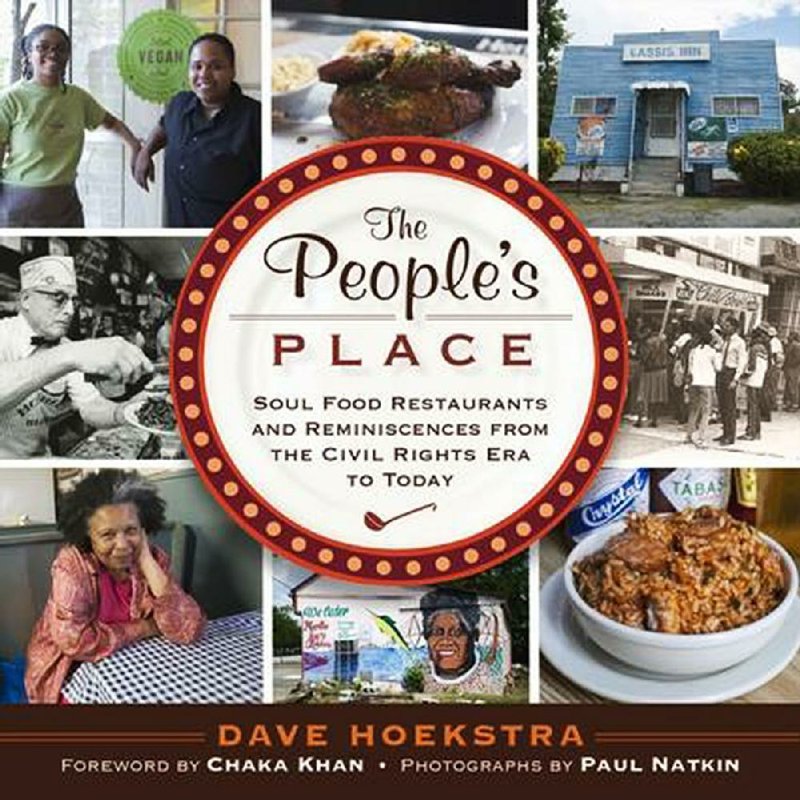The Lassis Inn in Arkansas. Ben's Chili Bowl in Washington. Dooky Chase's Restaurant in New Orleans. These were among the restaurants that offered a satisfying meal as well as support for women and men active in the civil rights movement.
As one regular at a now-closed cafe put it, "The food was the magnet for the mettle."
In his new book, The People's Place, the longtime Chicago journalist Dave Hoekstra writes about restaurants that served as "logical meeting places" for activists in the 1950s, '60s and beyond.
To do the reporting, he and photographer Paul Natkin embarked on a road trip, starting in New Orleans and driving to, among other cities, Memphis, Nashville, Tenn., Chicago and Detroit. They took one flight, and one "really crowded" Greyhound bus ("It was like Midnight Cowboy," Hoekstra said, laughing).
Hoekstra had a lot of good meals, but as he says in the book's introduction, "This is not a critical look at soul food or soul food restaurants." His goal, he writes, was "to be a clarion for gallant voices."
Following are edited excerpts from a conversation with Hoekstra.
Q: If someone wanted to follow your path but had time to visit only one city, what would it be?
A: Memphis -- I know at least seven or eight soul food restaurants in Memphis. But to get to what we're getting at in the book, with the whole combination of the food and the civil rights movement, the Four Way holds a special place in my heart -- they were so giving with their stories and with their hospitality. Just the whole history of Memphis and the civil rights movement -- we also went over to the Lorraine Motel (where the Rev. Martin Luther King Jr. was assassinated in 1968). There's a lot going on there.
Betty Joyce Chester-Tamayo (the owner of Alcenia's restaurant) -- she's great. She hugs every person who walks in the door. She said there were, like, only two or three people who ever jumped back. It's not really a shtick. I think she really means it. The connections run deep, and I think it's something important for what's going on right now in this country.
Q: When people go to the restaurants in the book, will they get a sense of history and the movement?
A: To varying degrees. Paschal's in Atlanta -- the original location is closed, but go to the new one. When you walk in, there are portraits on the walls of King, of Harry Belafonte, of Julian Bond. It's like a hall of fame of the movement. That hits you right away.
You go to the Four Way and (the owner) Willie Bates will sit down with people at lunch time, 2 in the afternoon when it's not too crowded, and he'll start answering questions and talking and be very free with sharing his history with tourists and strangers; that's a real slam dunk when stuff like that happens. Even at Dooky Chase's in New Orleans, if you can get there at the right time, they'll sit down and talk with you.
What these people did -- they were able to create a meeting place for the movement -- was really important. They were unsung heroes.
Q: Did you like soul food before you began work on the book?
A: I've always liked soul food; I just like the whole idea of soul, what soul is. What does soul mean, what does soul mean to different people? How do you get soul?
Q: And do you have a definition?
A: We asked that question a lot. The most common answer we got is, soul is love. But I also think soul is understanding.
Q: In your account of Martha Lou's Kitchen in Charleston, S.C., you observe that soul food was the original slow food.
A: Well, yeah -- not only in preparation, but in conversation and getting together and spending two or three hours in a restaurant just talking, discussing, going through stuff at a measured pace.
Q: You enjoyed baked chicken, lima beans, sweet potato pudding, catfish and, in Detroit, vegan soul (including "catfish" tofu). What would you recommend as a dining strategy?
A: I'd pace myself.
Q: Do these restaurants still have a role to play in 2016?
A: People get on social media, and they rant; the flip side of that is going into places like these and hearing the experiences face to face from other people. In this day and age, it's pretty powerful and important stuff.
Style on 05/31/2016
